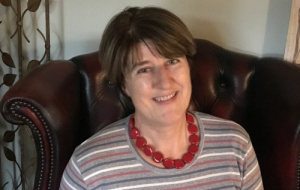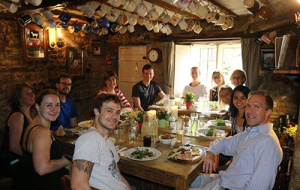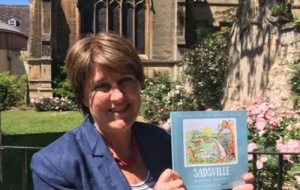Profile: Professor Elaine Fox

Supernumerary Fellow in Experimental Psychology
Professor Elaine Fox is Supernumerary Fellow in Experimental Psychology and Professor of Cognitive and Affective Psychology. She leads OCEAN (Oxford Centre for Emotions and Affective Neuroscience).
How and why did you become an academic?
I come from Dublin and went to university there at a time of very high unemployment. So, in 1983, when I finished my undergraduate degree in psychology – which I loved – the obvious thing seemed to be to continue with postgraduate studies. It was during this time that I fe ll in love with research and I was lucky to get a research assistant post in a research unit at a large Dublin hospital investigating the effects of benzodiazepine drugs – like valium – on human memory and response to stress. This job not only helped me to finance my PhD studies but also gave me great experience in multidisciplinary research working alongside pharmacologists, physiologists, medics and psychologists. When I graduated in 1988 I was offered a number of jobs in the UK in pharmaceutical companies, which did not really appeal, and then Victoria University of Wellington in New Zealand offered me a lectureship. At the age of 25 the prospect of moving to the other side of the world was too exciting to turn down. In New Zealand began what has turned out to be a long academic career in psychological science.
What is your connection to Univ? How has your experience been so far?
I was appointed to a Special Supernumerary Fellowship in 2016 and love being a part of the Univ community. I got involved early on with the Development Office and gave a number of talks at various fundraising events for the College. Meeting people from across the disciplines has been fascinating as has been the experience of meeting an impressive group of young women and men at the “Young Univ” events in London.

The OCEAN team on an away day at the pub!
Are there any misconceptions about the field of affective neuroscience you would like to combat?
Like psychology more generally many people think we are all clinicians and counsellors. However, many psychologists and most affective neuroscientists are empirical scientists who use a wide range of techniques and methodologies to understand fundamental processes of decision making, perception, memory, emotional reactivity and so on. To give an example, at a dinner that Univ held to attract potential philanthropists, one of the guests – a venture capitalist could not get his head around the fact that I sometimes use brain imaging (fMRI) to study processing of emotional expressions, “Ah” he finally concluded, “so you’re not really a psychologist, you’re a biologist”!
Do you have any writing tips?
My main tip would be to just start writing. We have all had the experience of staring at a blank page trying to think of the perfect start. I have discovered that the best thing is to just get started and worry about the editing and narrative later.

Professor Fox with “Sadsville”, a children’s book about feeling sad
Did you find writing Rainy Brain, Sunny Brain different to writing academic texts?
Yes, writing for a general audience is completely different to writing scientific papers and I loved the freedom it gave. You need to think a lot about everyday examples and metaphors to illustrate the science you are trying to explain. It also gives you free rein to tell some personal stories about what it is really like behind the laboratory doors and I really enjoyed that. Writing a popular science book also gives you great opportunities to speak at literary and other festivals and I was thrilled to discover such an appetite for knowledge and information among the general public.
Have you faced any challenges pursuing academia?
Academia is filled with challenges! One of the greatest is obtaining sufficient funds to build up and maintain a research group. Most grants you apply for do not get funded so resilience is definitely needed! I have been lucky over the years to have been awarded a number of large grants, most recently from the European Research Council which allowed me to build up a relatively large research group here in Oxford. However, that project finished this year and I lost a number of great postdoctoral scientists who had to move elsewhere. You just have to keep going as well as being flexible about where you can find new sources of funding.
How do you relax?
I love travelling, though don’t travel as much as I used to, mainly because I lack the time. Running is a life-saver for me and very relaxing. I am very slow but I can keep going! Running in this year’s Oxford Town & Gown 10k in Univ colours was great fun. I also find reading spy novels to be very relaxing.
 How do you feel about the celebration of 40 years of women at Univ?
How do you feel about the celebration of 40 years of women at Univ?
My first impression on hearing about the 40-year celebration was one of shock. It seems such a short time ago! However, the celebrations so far have been great. I really enjoyed the fantastic exhibition of Women in Univ 1249-2019 put together by Laura Varnam and Robin Darwall-Smith, which I have seen twice now. I am also enjoying meeting many of the women from across the Univ community in various meetings we have had about potential events to celebrate the anniversary. It is so important to bring the often hidden history and contribution of women to our community to the fore and Univ is doing a great job of this year, which I am sure will continue into the future.
Professor Fox was recently named the UK Research and Innovation Mental Health Networks Coordinator. Her books, including Rainy Brain, Sunny Brain and Emotion Science, are available to buy in bookshops and online. You can listen to her speak about emotions on the Blackwell’s podcast. Professor Fox also posts regular updates on her life and work on Twitter.
 Women at Univ 2019. Celebrating 40 years of achievement by women students, academics and staff, and recovering the history of women in the College from 1249 to the present day.
Women at Univ 2019. Celebrating 40 years of achievement by women students, academics and staff, and recovering the history of women in the College from 1249 to the present day.
Published: 24 October 2019
